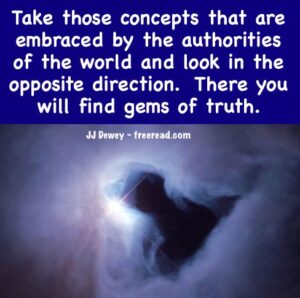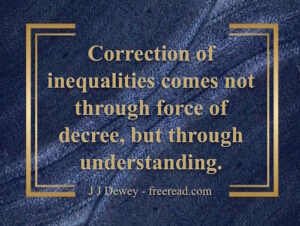
Chapter Forty-Three
Molecular Politics, Part I
One point most of us agree on is this. The legislators in the United States and all other free countries do not represent the will of the people to the satisfaction of the people. The majority of common people everywhere seem to feel somewhat betrayed by those who are expected to represent their interests. We find that instead of representing the interests of the people they either represent their own interests, the interests of party leaders or some other entity.
This seems to be a problem that we have all accepted as a necessary evil, but the true spiritual teachers and dreamers of the race do not accept flaws such as this as a permanent thing. Such people will say along with the late Robert F. Kennedy: “Some people see things as they are and ask why. I dream things that never were and ask, why not?”
Instead of just accepting the necessary evils of our society and wondering why they have to be, let us elevate our minds to a higher level and dream of things better and ask: Why not?
Why not have a political system where the people are truly represented to the extent that they are satisfied that one voice is as important as another? Just because this is not the case now does not mean that the lights of the world cannot make creative change and make the dreams of the ages come true.
Even though many feel in their hearts and minds that a true democracy would be a wonderful thing there are many intelligent people who oppose it on an intellectual and philosophical basis, but I wish here to show that this basis is founded in illusion.
In the United States (and many other nations) pure democracy is opposed for two main reasons:
[1] It is not constitutional. We have a Republic that calls for a representative government where a one person is elected to cast a vote for the many.
[2] The polls that are continuously taken now illustrate that average John Q. Public is ill informed and that the majority will often support silly, immoral or dangerous notions. Even Hitler ran around 70% in the polls in his heyday.
Objection One: A true Democracy can function within the framework of our existing Constitution. Nothing has to be altered in the original document as we will illustrate in this treatise. We will clarify this as we proceed.
Objection Two: As we read about the various polls taken past and present it does seem at times that John Q. Average is misinformed, sometimes even a little unbalanced and certainly not one to whom we wish to trust the destiny of the nation. If the polls are any indication of how a true democracy would vote then it does seem wise to be against it.
Let us dispel this illusion by one statement of fact: A true democracy is not a poll and the results of the will of the people expressed in it will be much more logical and beneficial for the whole than a rule-by-poll would be.
Why is this?
Because the method of obtaining the vote is very different between the two.
There are three differences.
[1] In a democracy all who desire to vote are represented whereas in a poll only a very small percentage voice their opinion.
[2] In a true democracy people vote out of their own initiative because they know and feel something about the issue, but in a poll they use no initiative, but are contacted by a pollster. Many of those contacted through a poll would not be informed enough to even have a desire to vote in a democracy. Let us point out that in a true democracy the citizen is not forced to vote, but all who desire have the privilege of voting. This means that those who are ill informed and do not care about government will usually not vote. Thus in a democracy you will have a much more intelligent voting populace than you have in many polls.
This truth is illustrated by comparing polls taken on the internet verses polls taken by telephone. Internet polls that are equally accessible to the left and right are much more representative of how the results of a democratic vote would be than a telephone poll because those who respond are using their initiative to make the contact and are involved enough to be concerned about the issue.
As you compare similar issues responded to by regular polls and internet polls you will notice a huge difference in the direction of common sense for the internet polls. For instance, in the OJ trial regular polls had the public fairly evenly divided on his guilt or innocence, but in the internet polls people overwhelmingly thought he was guilty from the beginning. The latter obviously reflected the majority view which still exists.
It is interesting to note that polls have gotten less reliable over the years rather than more. I remember way back to the campaign of Nixon and Kennedy that the polls had then both in a dead heat. It was so close that few dared guess who the winner would be. The interesting thing here is that is just what happened. It was one of the closest elections in history just as the polls predicted.
Now in recent national elections the pollsters have been far less accurate than those way back in the Sixties. A prime example is from the 2024 presidential election where celebrated pollster Ann Selzer had Harris leading Trump in the swing state of Ohio 47% to 43%. The actual results turned out that Trump won Iowa by 13 points, 56% to 43%.
Other pollsters in recent years have off about 10% nationally and with various states . That’s an error level about twenty times as high as the polls were back in 1960 when technology was nowhere near what it is today.
Why the big difference between polls and actual results?
The answer is that in its infancy the polls were used in a fairly logical and sincere effect to find the truth whatever that may be. Then one day it occurred to the powers that be that people were influenced by the polls. No one likes to look stupid and if it appears that everyone thinks XYZ is true then one may as well go along with the idea, especially if he is not sure his or her opinion is right to begin with.
Thus began the “everybody-thinks-this-way-and-so-should-you” polling concept. This new direction in polling does not reveal the true minds of the thinking public, but instead is a tool for influencing public opinion.
The power of influence on the non-thinking public of the “everybody-thinks-this-way-and-so-should-you” concept is very powerful and very much full of illusion. Remember the Milgram experiment? The subjects were willing to fry a man’s brains out because of the demand of an authority and also the implanting of the idea that other subjects were doing the same thing. These poor dupes were willing to risk the electric chair just to fit in. This illustrates how powerful the “fitting in” principle is and why the polls can become a dangerous weapon against real democracy or any representative system.
In the Sixties the polls were generally worded to find the truth, whatever that may be. Now, in this generation, the polls are carefully worded so predetermined results will be obtained. In addition to this many polls use a carefully selected group of people whose opinion is already established.
Let us create an example of how a poll may be used to promote illusion; the topic of education provides a good example. This is a vulnerable one for the masses, as everyone wants to do all they can to ensure that our kids get the best in education, even if it calls for a sacrifice.
Imagine that a group of Congresspeople want to pass a big spending bill for Boondoggle Project #473 and they fear the public would be enraged at such a waste. Therefore, they decide to attach the spending for this project as a rider attached to an education bill because everyone loves and supports education. They therefore whip up a billion dollar education bill that sounds good, but is, in reality, a complete waste of money.
It turns out that over half the money in the bill goes to pet projects of those who created it, often crazy things that the voters would never approve in isolation. Then the money that does go toward education supports the creation of more administrators and more cushy benefits to current leaders. Maybe a couple percent of the funds go to benefit the teachers and the kids. The administrators are looking forward to using the extra money for educational “seminars” in Hawaii and the Bahamas.
Then begins the presentation and promotion. Congressional members who favor the bill present it as an education bill, money for “our kids,” “our future,” money that will help us catch up to other enlightened nations. Immediately all educational leaders join in support of the bill because they (mostly administrators, not the teachers) will greatly benefit. They immediately start repeating the mantra that this bill is “for the children,” and do their best to make anyone who opposes it as appearing to “hate kids.”
A handful of honest legislators actually read through the bill, see through the illusion and realize that it is a complete waste of money. As soon as their views are announced they are pounced on by supporters of the bill as being “against education.” They are also accused of “hating the kids.”
Shortly after these mantras are circulated a poll is commissioned by the supporters of the bill. Here are the questions:
[1] Do you support the XYZ education bill which will give more money to our schools so they can raise the educational level of our kids?
[2] Do you approve Congressmen Smith and Jones who are against the bill?
Now when the uninformed are called and hear these questions they think within themselves, “sure I’m for education. Let’s spend the money.”
Then in response to the second question they automatically think that Smith and Jones must be about as low as you can get for being “against the kids.”
Next the results of the poll (which is overwhelmingly for the bill and against Smith and Jones) is given to the media. Then the media without questioning or research announces the results and pretty soon the majority of the people are overwhelmingly in favor of the bill and see Smith and Jones and public enemies.
Now Smith and Jones who are the only ones in public favor of the truth are totally on the defensive and every time they are interviewed by the media, they are approached in an attack dog method and find that they spend all their time in defense rather than explaining their position. Finally, Smith and Jones withdraw into the woodwork thinking that if they keep quiet they can at least preserve what little image they have left.
Finally, the actual vote takes place and the two pork spending bills pass the house and goes to a Senate and President that does not dare reject it. Then when the next election comes around those who voted against the bill are attacked as being anti education.
Now this is a fictional account, but it represents a political process that is repeated over and over again and supported by an uninformed public. It illustrates to us the great present-day problem with the polls as well as the political process, but such problems will not be perpetuated by a true democracy. Instead, the problem will be cured.
In the democracy proposed here the voters will be more informed and the illusion caused by the polls will be dispelled.
Question: Why would a true democracy create more intelligent government than the current system? Isn’t an elected representative more intelligent and informed than John Q. Average?
Molecular Politics Part II
Negating the Will of the People
In all countries where there are free elections you have political parties that represent the conservative side on one hand and the liberal side on the other. In this treatise we shall mainly deal with politics as they exist in the United States, but the principles under discussion should apply to all free countries for they all have an interplay between the pairs of opposites.
Some countries have numerous parties representing the two sides, but in the United States over 90% of the population is generally represented by the two major parties – the Republican and Democratic parties.
Both parties claim to represent the “people,” but in reality each party represents the view of fewer than 50 per cent of the voters because of third parties and independent people.
Therefore, if you are a Democrat and are in a district where a Republican is elected you have to bite your tongue until the next election or longer. Then if a Democrat is elected at that time the Republican has to wander in the limbo of not being represented.
The point is that no matter who is elected only a minority is represented and the rest of the people are very disgruntled that their view is completely bypassed until their side wins again. Wouldn’t people be much happier if their views have a chance of being represented at all times?
This may seem like a pipe dream, but through the principle of Molecular Politics this becomes possible.
But before we get to the solution let us make sure we understand the complete problem. In addition to the frustration of not getting our party of choice in office half the time, voters also suffer considerable frustration when their candidate of choice seems to wander off the expected course and votes on numerous occasions contrary to even the will of his supporters.
There are seven strong influences on politicians that cause them to ignore the will of the people whom they claim to represent.
[1] Polls. We have already illustrated how polls are manipulated to appear as if they represent the will of the people when sometimes they do not. If the politician votes according to the polls his real voters will often be frustrated.
[2] Political groups, action committees and all those with a political agenda who contribute a significant amount of money or influence to help the candidate get elected. When this occurs candidates incur the well-known political debt that they must repay while in office or incur the wrath of those who put them there. If they refuse to vote in a way that pleases these powerful ones then they will work against the rebellious candidates in the next election.
Is the will of the people represented when the politician votes the will of the few powerful ones who provided financing?
No. Of course not.
[3] The third obstacle that interferes with the will of the people are special interest groups and large corporations who spend many millions in lobbying politicians so they will vote and legislate according to their will.
These lobbyists will visit targeted legislators on as regular basis as possible and lay their cause and wishes before them. They will also throw parties, wine and dine, and arrange field trips in the Bahamas and other exotic locations so the legislators can become better informed of certain problems. They also help to arrange for fund raising contacts to help assure reelection.
Now let us say it is time to vote for project X. The majority of the people are against it and a few have written letters about it, but they have not captured the Congressperson’s attention nearly as much as the constant influence and “assistance” of the lobbyist. When it comes time to vote, they vote “yes” because the pressure, the gifts, the parties, the free vacation are very fresh in their minds.
Let us ask this. When politicians vote the will of special interest groups are they truly representing the will of the majority of the people they claim to represent? In many cases the answer is a resounding “no!”
[4] Another common way that the people are not represented is through the trading of votes.
How does this happen? Here is an example: Let us say, for instance, that the Senator from Arkansas wants a grant for research into chicken feathers and the Senator from Idaho wants money for research into the control of the rabbit population. Now neither of these projects have enough support to pass, but each one of these guys would be a big hero in their home states if they could bring home the big bucks. So here’s what they do. The Senator from Idaho approaches the senator from Arkansas and says. I don’t really care about your feather research project in Arkansas, but I desperately need to get my rabbit project passed so I’ll tell you what. You vote for my project and I’ll vote for yours.
The Arkansas Senator jumps at this and agrees, and so they make a trade or agreement and support each other’s projects even though neither the Senators nor most of their constituents could give a rat’s behind about it.
So when the Senator from Idaho votes for the feather project in Arkansas, is the will of the people being truly represented?
We often hear of strange projects that our Congress spends millions of dollars on, like the study of the sex life of a mosquito, and we wonder who was crazy enough to have voted for such a thing. This trading of votes is part of the answer and is also one of the reasons Congress always manages to spend more money than they should.
[5] Another problem interfering with representation is ignorance. You have probably heard about pieces of legislation that are accompanied by something like 1,500 pages of research. Do you think our legislators take the time to read the whole thing? Very rarely. The real truth is that they often do not even read one page of material that is related to a bill they are voting on. Quite often all they know about the bill is what they have heard tossed around in debate or what their party bosses have told them.
Many bills have riders attached to them that will have more teeth than the bill itself. Often times the politician will know only a small amount about the bill and little or nothing about the riders, unless the rider happens to be a pay raise congressional members.
Therefore, we ask, when legislators vote for something they know little or nothing about can they in any way truly represent the will of the people who voted for them? Again, the answer is no.
[6] Influence from party leaders is another big item. We have seen time and time again that close to 100% of legislators vote along party lines on major items because of pressure from their leaders and the group itself.
From the time we were teenagers most of us have had some desire to fit in with a group and conform. This influence carries over in many ways to adulthood and is strongly manifest when our guy goes to Washington. We have seen time and time again that a person with high goals and good intentions goes off to Washington only to wind up under the thumb of party leaders and Washington influence.
When your representatives in Washington vote according to the wishes of party leaders are they then representing the will of the folks back home? Again the answer is obvious.
[7] The final barrier to real representation is prejudice. Elected officials have certain preconceived notions and religious convictions that are not the same as us folks who voted for them.
If they believe that the earth is only 7,000 years old because of religious conviction will this not affect their votes on education which teaches evolution?
If their religious convictions makes them strongly for or against abortion we know that there is nothing in the world including the will of the people, that will alter their vote.
If representatives use pot then they will generally support the legalization of it.
If they have lots of children they will favor tax breaks for families and so on.
Each legislator brings numerous prejudices to voting that have nothing to do with the will of the people.
So when we view all seven of these obstacles to the will of the people we may feel overwhelmed and feel within ourselves that we should just give up trying to change anything and just hope for the best.
The truth is that we do not have to give up on the possibility that the will of the people can become truly manifest. Such a thing is not only possible, but it is the destiny of the age to come.
There is a solution to these seven obstacles and they can be eliminated in one master stroke which is in complete harmony with the Constitution of the United States and most other free countries. Instead of just complaining about political situations, in our next article we will present a practical solution that will revolutionize the political world and eventually become a subject of great debate.
Molecular Politics Part III
A New System
In part II we talked about seven barriers that prevent our representatives from truly representing the people. In a word they are (1) Manipulated polls (2) Political action groups (3) Lobbyists (4) Trading votes (5) Ignorance (6) Pressure from party leaders and (7) Prejudice.
For many years these problems have seemed insurmountable to critics of the system. These problems with government just seem to be something that we have to put up with. Not only can you not fight city hall it seems that you cannot change it.
Actually, the only way to fight city hall (or Washington) IS to change it. Most people just throw their hands up in the air and believe that change is impossible, but change is not only possible it is inevitable. Sometimes change comes quickly and sometimes slowly, sometimes for the better and sometimes for the worse, but it does always come and nothing can stand in its way.
We are reaching a point of tension in the free governments of the world. Almost without exception governments which are supposed to be the servants of the people are becoming larger, more distant and more encroaching on the lives of the decent hard-working people. Spending always seems to go up which is generally followed by taxes going up. As more and more people get hooked on government benefits, greed and laziness sets in and these citizens who think they deserve more than those not getting benefits begin to demand more and more for themselves.
The drift toward more intrusive government in the lives of the common person can only go so far before change will come. The change will be one of two directions: (1) Governments will become all powerful thus preventing people from complaining about them or (2) the people themselves will institute change so power is given back to them where it belongs.
This treatise and others I will write is to ensure that the good change comes rather than the evil. We must change our belief system from thinking that we are caught in whirlpool of political energy that is sucking us into situations of less and less control. Instead, we must think of solutions that bring us greater control, freedom and expression.
One of the first steps is to institute a system whereby the people will be insured greater representation.
In the past when innovators have had new ideas, they started a new political party around it. In the United States this has been quite futile. The two most popular third parties in the United States are the Libertarian and the Green Party. There are many others of little influence that do not have a prayer of electing a national candidate.
Let us briefly touch on the strongest of the third parties. The Libertarians have as their major objective “liberty” as illustrated by their name. They basically believe that if we have two political choices we should pick the one that brings the greatest freedom.
I personally believe this is the highest objective of any of the parties as freedom and liberty is certainly a principle that the average people heartily support. So why have they never succeeded in getting any significant numbers of candidates elected? Why do they usually get less than one percent of the vote in national elections?
The answer is simple. People of today are attracted to the safety of the status quo and strong personalities more than ideas. This is why the good ideas of the Libertarians accomplishes very little. If they do start to catch on the major candidates will claim that they already have those bases covered so why vote for an unknown?
Even if we have the best ideas on God’s green earth a third party is not the way to go. Without a ton of money or a strong national presence it would take years to gain much momentum.
Instead, we will present here a solution which is unique in that it does not advocate the creation of any additional political party yet this organization will win elections with greater and greater regularity until all will join in with this system because it will bring true representation.
Instead of organizing a new political party that will struggle on for decades we will create a committee that will work with existing parties. If we can influence candidates in the existing parties to truly represent the will of the people then the mission is accomplished.
Here is how that can happen:
First, we will create an organization called “The Committee for Representation.” The name is not written in stone, but it should have the word “represent” in there someplace because that will be its core purpose – to bring representation to the people.
The purpose of this committee will be to commit the various politicians to directly represent the will of the voters. This effort will at first be a futile one with those already elected so concentration must be placed on those who are willing to make an initial run for the office.
Here is what the committee will do. It will approach a candidate with this proposition: “Our organization will help you get elected if you are willing to make an ironclad commitment to vote the will of the people you represent, but then, after you are in office, if you break your pledge, you will suffer humiliation of dishonor and all of our support will be withdrawn and we will assure that you will not become reelected.”
The point of power for the people is before the election because it is at this time that the candidate will do almost anything to obtain the office. Still this pledge is not to be taken lightly because it does require a large sacrifice from the ego of the politician. It demands that he or she recognize that the voice of the majority of concerned citizens is more important than that of one’s own little will. Therefore, one with an inflated ego will not even work with the Committee because big egos run for office thinking they knows better what is good for the people than the people themselves. In rare exceptions this may be true of sincere servants of humanity, but since we cannot depend on such people obtaining office we must look to the will of the people for safety.
Now the politician may say, “Sure I’d be happy to vote the will of the people, but isn’t that what a representative does anyway?”
The answer is no. Most politicians only listen to the will of the people when it puts their reelection on the line. The Committee has a better plan and here is how it works:
Any citizen who is willing to participate can apply to the Committee and become registered as a Co-Legislator. Then as a Co-Legislator you review various items coming up for vote and study them out and vote for them just as if you were a member of Congress yourself. The Committee then tabulates the vote and passes it along to the endorsed Congressperson. The elected Representative who is then sponsored by the committee is now committed to vote the will of the majority no matter what personal feelings on the matter are.
Can you see what this accomplishes? In one master stroke the seven obstacles to the will of the people are nullified.
[1] Polls. It doesn’t matter what the polls say – the representative must vote according to the real will of the informed people casting an actual vote.
[2] Political action groups. It wouldn’t matter how much money they give to candidates’ election because they are committed to vote the will of the people rather than the action committee.
[3] Lobbyists. The Lobbyists could wine and dine the Representative all they want and would have little or no influence because the guy has to vote the will of the people.
[4] Trading votes. Representatives cannot trade votes because the final vote no longer belongs to them, but to the people.
[5] Ignorance. Ignorance is eliminated because the Co-Legislators with enough interest to vote on a matter have usually checked into it and become informed on the subject.
[6] Pressure from party leaders. The party leaders can pressure the Representative all they want but he or she is committed to the will of the people above the party so they will be ignored.
[7] Prejudice. Molecular candidates have already committed themselves to lay aside their prejudices. If they cannot commit to do this they will not be endorsed by the Committee.
Now just wait a moment says the skeptic. This may sound good but it just will not work. There are too many flaws in human nature. When our guys get to Washington and all this pressure is put upon them, they will ignore the votes of the people who elected them and vote the way they see fit.
This will definitely be a problem to be dealt with but it is a problem that will be solved. We do not know all the solutions before all the problems arise, but we can present some of them.
First, the Committee will not endorse a candidate who has a history of lying or not keeping promises. All other candidates of good report from all parties are welcome to apply for endorsement.
Then we get definite signed commitments from endorsed candidates to vote according to the expressed will of the people. If they break this pledge, even once, then the support of the Committee is withdrawn and the chances are that they will lose the next election. In addition to losing the next election they will be disgraced the moment the pledge is broken because the Committee will publicize the fact that a Representative violated the pledge.
If you do not think that this concept has power just look what happened to George Bush Sr. in 1992. Shortly before the election he had one of the highest approval ratings in history – around 90%, but then his opponents hit him hard on his broken promise of “no new taxes.” This resonated strongly with the American people and he lost the election.
It may seem that honor and personal integrity is a thing of the past, but in reality, it is never lost. Whenever we reach a period in history where we seem to be at a low point then we see an individual or group comes forward and demonstrates true honor anew, the value of it is registered in the consciousness of many people and a new cycle is begun.
It is interesting that when the Founders of the United States signed the Declaration of Independence that one of the things they pledged and put at risk was their “sacred honor.”
How long has it been since honor has been thought of as a sacred thing? Too long. At this point in time honor is at such a low point that we expect to be betrayed by those whom we are supposed to trust. Then when we are betrayed, we throw our hands in the air and say “same ol’ same ol’.” But the time is approaching when honor must be restored to its proper place as a “sacred” characteristic not to be compromised. The time is come that those who betray us are not accepted as just “being human,” but for being a traitor to human dignity and achievement.
The Committee for Representation will use every possible legal and ethical means to restore honor as a sacred principle in the consciousness of the nation and world and put as much pressure as needed on the Representative to keep his pledge.
Question: So what if the guy does not keep his pledge? What can the Committee do?
Answer: If the Representative is totally dishonorable there is little we can do. The Committee can publicly announce the betrayal and call for the Representative’s resignation and then support a different candidate in the next election. If public opinion is roused enough some of the dishonorable ones will resign. If nothing else, the public disgrace will be enough to send a message to the other endorsed Representatives to not betray their word.
Question: You say the voting is done by Co-Legislators. How are they selected?
Answer: They select themselves. This position is open to all legal voters of all races color and creeds. All a voters have to do is to prove they are a citizen and a potential voter in the district or State of the Representative or Senator with whom one is going to Co-Legislate.
Question: How will the Co-Legislator cast his vote?
Answer: After the voter’s identify is proven the co-legislator will be given an e-mail address that is to be used exclusively for voting. Only one address will be given per voter and only one vote on an item can be cast per address. When voters are properly set up to vote then they merely send it through the Internet on a secure program thar will be developed.
Question: How will the Co-Legislator get information about upcoming bills and items to vote on?
Answer: Fortunately, in this technological age we have easy access to information through the Internet. The Committee with the help of the Representatives will gather all information on upcoming items that are coming up for vote and will post them on the Web. The voters can then download information on items of interest, study them and vote according to their viewpoints.
In addition to the cut and dry wording of the various pieces of legislation, the Representative and the Committee will also post news articles, columns and comments made by people of prominence about the legislation.
Representatives will also post their opinions about the matter and whether or not they think the vote should be yes or no. If they are doing their job properly their opinion will carry quite a bit of weight with the voters because they will often have insight that others may lack.
Nevertheless, voters are free to accept or reject the Representative’s suggestion.
Question: Not everyone uses technology or is computer literate. How are these people supposed to vote?
Answer: If they do not have a computer they can go to the public library and set up an e-mail account and also gain internet access.
On the other hand, if they have a complete block about using computers and wouldn’t know what to do if they had one, they can then go to one of the offices of the Committee for Representation. There a volunteer will set them up with an e-mail account and do all the computer work for them. Hard copies of all legislation will be available for the untechnological people and copies will be made and distributed on request. Thus even the most computer illiterate among us will have full access to all information and voting privileges.
We might note here that we are approaching a time in which close to 100% of the people use technology to some degree. Techno literacy will soon be an insignificant problem.
Question: Many people are very incredulous of poll results and are down on the idea of voting by polls. Wouldn’t this be a similar thing?
Answer: Not at all. As we previous discussed polls can be manipulated and very deceptive but a direct vote from an informed people is a true representation of what they really desire.
Co-Legislators do not receive some phone call while they are in the middle of dinner asking their opinion on something they could care less about. Instead, they select items that are of interest to themselves and vote because they are informed and concerned. This produces a much more intelligently cast vote than any poll and brings true representation.
Question: So what are the elected officials supposed to do? Twiddle their thumbs?
Answer: We admit that they will not be as occupied with lobbyists, action committees and fundraisers as much as other legislators, but they should be busier than ever concerning the people’s business.
This new generation of legislators will not be in the position for the power but for service to their country. The motto will be: “What can I do for my country?”
As true public servants they will be looked upon more as managers and teachers by the voters rather than those who vote their own will.
As managers they gather data and inform their constituents. As teachers they explain the issues at hand so the Co-Legislators can make the most intelligent of decisions.
Question: What if the legislator has to vote yes on a bill that is totally contrary to either one’s conscience or good sense?
Answer: There will be times that the various legislators will disagree with the vote of their Co-Legislators, but they will be tested for their open mindedness before they are endorsed by the Committee.
For instance, one of the hottest topics of the day is abortion. Feelings are very strong in both directions. If the Committee were in place today one of the questions to be asked potential legislators would be something like this: “If an abortion bill came up for vote would you be willing to vote the will of the people above your own in the matter?
If they cannot answer yes to this and other questions on controversial issues then the Committee could not endorse them.
Those in support of this new system will come to realize that they may not get their way all the time, but that the votes cast will overall be in a safe and sane direction that brings more opportunity to the common people and less intrusion of government into our lives.
I recently heard a commentator make a shrewd observation. He said that both the Democrats and Republicans support government intrusion into our lives. The Democrats want economical intrusion and the Republicans want moral intrusion. Through the Committee for Representation, we can assume power to limit both forms of intrusion into the comfort zone of the average person, which is not now the case.
Question: I have to admit that this idea sounds pretty good. It seems like it should be an easy sell.
Answer: Nothing innovative, no matter how good it is, is easy to sell to the masses. In general people are skeptical of new things. The first thing they look for is the sinister motive behind the initiator.
My answer to that problem is the question: what could be sinister about the will of the people being represented more completely?
Nothing.
On the other hand, there will be enemies of this idea and it will be interesting to see them crawl to the surface. Many current politicians who enjoy the full power of their office and delight in being catered to because of having the full power of their vote will certainly be negative on the concept. Lobbyists who will lose much of their power will fight it tooth and nail. Party leaders will be aghast because they will no longer be able to command voting blocks as they have in the past. Some will be up be upset that they can no longer trade votes.
In addition to this many fringe groups on the edge will be upset that their ideas will have little chance of getting public attention because the common sense of the Co-Legislators will override extreme ideas that are dangerous to the nation.
On the other hand, a common sense fringe group has a good chance of going mainstream through the new system.
If an idea is truly good it will sooner or later be embraced by the majority.
Question: You seem talk about national politicians, but how about State and local governments and the Presidency itself?
Answer: This process is most needed among national Representatives and Senators. It could also be used to a degree with a cooperating President. As it is instituted effectively on a national level then we can see more clearly about how it can be applied to lower-level offices, but currently most local representatives are more in harmony with the will of the people.
Question: Is this concept Constitutional?
Answer: Yes. It works within the framework of the established Constitution and national laws. That’s the beauty of it. The Committee for Representation works within the framework of the establishment. It will be like a shot of strong medicine given to a sick body.
Once this new system is securely in place party affiliation will fade into the background for it will not matter which party is elected, and the keynote for government becomes unity not division.
An expanded presentation of this is given in my book Molecular Politics – Fixing America.
To search the website, containing millions of words, replace the word “search” with the word or phrase you want to find and place the entire line in the Google search box.
“Search” site:freeread.com
To access all the chapters so far see the directory at the top middle next to the meme.
For videos explaining the Molecular Relationship go HERE:
Join JJ’s Facebook group HERE
Easy Access to All the Writings
For Free Book go HERE and other books HERE
JJ’s Amazon page HERE








